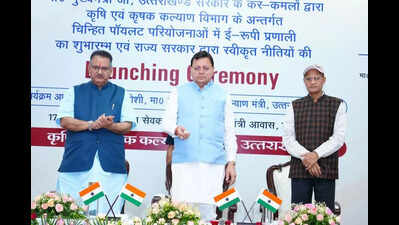Dehradun: Chief minister Pushkar Singh Dhami on Saturday inaugurated ‘e-RUPI’ system at the Secretariat in Dehradun. Along with this, he launched four agricultural policies: the kiwi policy, dragon fruit policy, post-harvest apple management plan, and the millet mission.“The e-RUPI system will become a transparent, fast, and intermediary-free digital payment method for farmers. Under this system, the subsidy amount in pilot projects will be sent directly to farmers’ mobiles via e-vouchers (SMS or QR code), which they can use to purchase fertilisers, seeds, medicines, etc., from authorised centres or sellers,” said the CM.Dhami directed officials to organise training programs in villages to educate farmers about the e-RUPI system, ensuring they can fully benefit from this technology. “The objective of these initiatives is to strengthen agriculture and employment in the state’s hilly and plain areas, effectively controlling issues like migration. These schemes will prove to be milestones in making Uttarakhand a self-reliant, empowered, and leading agricultural state,” he added.During the event, agriculture minister Ganesh Joshi outlined the goal of developing 5,000 hectares of ultra-dense apple orchards by 2030-31 to boost apple production. A plan worth Rs 144.5 crore has been launched for apple storage and grading. Additionally, Joshi highlighted that under the millet policy, Rs 134.8 crore has been allocated to cover 70,000 hectares by 2030-31, with incentives for seed sowing and crop purchase.The kiwi policy includes a project costing Rs 894 crore, with an annual production target of approximately 14,000 metric tons. The initiative aims to cultivate kiwis on 3,500 hectares over six years, directly benefiting 9,000 farmers. The dragon fruit policy, with a total project cost of Rs 15 crore, aims to boost production on 228 acres, resulting in an estimated output of 350 metric tons.Meanwhile, the post-harvest apple management plan, valued at Rs 144.5 crore, will cover 5,000 hectares with ultra-dense orchards. Projects under the millet policy, worth Rs 135 crore, seek to bring 70,000 hectares under millet cultivation in 68 development blocks, rolled out in two phases.


